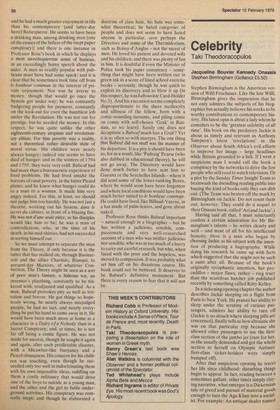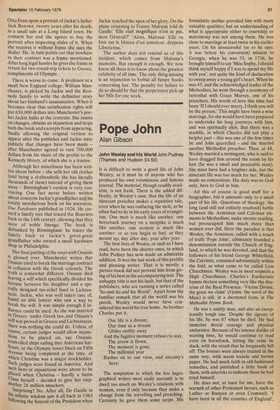Celebrity
Taki Theodoracopulos
Jacqueline Bouvier Kennedy Onassis Stephen Birmingham (Gollancz £5.50)
Stephen Birmingham is the American version of Willi Frischauer. Like the late Willi, Birmingham gives the impression that he not only admires the subjects of his biographies but actually believes his works to be worthy contributions to contemporary history. His latest opus is about a lady whom he considers to be the 'greatest celebrity of all time'. His book on the predatory Jackie is about as timely and relevant as Anthony Sampson's latest 'revelations' in the Observer about South Africa's evil efforts to improve her image large headlines while Britain grounded to a halt. If I were a suspicious man I would call the book a conspiracy by the networks to drive the few people who still read to watch television. Or a plot by the Sunday Times Insight Team to brainwash the dwindling reading public into buying the kind of books only they can dish out. (The Team was beaten off the mark by Birmingham on Jackie. Do not count them out, however. They could do a sequel to their Onassis book, called 'An i and Jackie'.) Having said all that, I must reluctantly confess a certain admiration for Mr Birmingham's talents he writes clearly and well and most of all for his intellectual honesty. Here is a man who began by choosing Jackie as his subject with the intention of producing a hagiography. While doing his research he came up with facts which suggested that she might not be such a saint after all. Because of the book's originally sycophantic intention, her peccadillos major flaws, rather ring truer than the scurrilous hatchet job published recently by something called Kitty Kelley.
In a sickening opening chapter the author describes Jackie sleeping on a flight from Paris to New York. He praises her ability to sleep under the scrutiny of curious passengers, admires her ability to turn off (Jackie is no slouch where sleeping pills are concerned), finally tells us how altruistic she was on that particular trip because she allowed other passengers to use the firstclass section of the jumbo jet (rare for her, as she usually demanded and got the whole section to herself on Olympic Airlines: first-class ticket-holders were simply bumped off). After that auspicious opening he traces her life since childhood: disturbing things begin to appear. In fact, reading between a sometimes gallant, other times simply claying narrative, what emerges is a Dickensian tale of greed and pursuit of material goods enough to turn the Aga Khan into a socialist. For example: An antique dealer named Otto Fenn spots a portrait of Jackie's father Jack Bouvier, twenty years after his death, in a small sale at a Long Island town. He contacts her and she agrees to buy the portrait after inspecting slides of it. When she receives it without frame she sues the dealer. He, in turn points out that nowhere in their contract was a frame mentioned. After long legal hassles he gives the frame in return for two round-trip tickets to Greece, compliments of Olympic.
There is worse.to come. A professor at a small New England college, William Manchester, is picked by Jackie and the Kennedy family to write the definitive story about her husband's assassination. When it becomes clear that serialisation rights will Put 650,000 dollars into Manchester's pocket Jackie balks at the contents. She insists on changes, obtains an injunction and stops both the book and excerpts from appearing, finally allowing the original version to appear after the publisher and Jackie state Publicly that changes have been made — after Manchester agreed to turn 700,000 dollars from his share of the profits to the Kennedy library, of which she is a trustee.
Although her miserliness has been written about before — she sells her old clothes (and being a clothesaholic she has literally thousands of them) instead of giving them away — Birmingham's version is very convincing. One fact never before written about concerns Jackie's grandfather and his totally mendacious book on his ancestors, Our Forebears published in 1926. He created a family tree that traced the Bouviers back to the 14th century, showing that they were of noble lineage. The book is debunked by Birmingham: he traces the family back to Jackie's great-great grandfather who owned a small hardware Shop in Philadelphia.
Her final parting of the ways with Onassis IS glossed over. Manchester writes that Onassis tried to break the marriage contract in collusion with the Greek colonels. The truth is somewhat different. Onassis died leaving a will which specifically divided his fortune between his daughter and a specially designed tax-relief fund in Lichtenstein. Jackie, who was well taken care of, found an able lawyer who saw a way to break the will. It was simple enough if influence could be used. As she was married in. Greece under Greek law,and Onassis's Will was proved in Greece and Lichtenstein, there was nothing she could do. Unless, of cOurse, certain judges would allow injunctions, to be placed on, say Onassiscontrolled ships sailing into American harbours, or the Olympic tower block on Fifth Avenue being completed at the time, of Which Christina was a major stockholder. Such judges were found in America. And such liens or injunctions were about to be Placed when Christina — hardly a Santa Claus herself — decided to give her stepMother 26 million smackers.
Surprising? No. After all, De Gaulle in lus infinite wisdom saw it all back in 1963 following the funeral of the President when Jackie reached the apex of her glory. On the plane returning to France Malraux told de Gaulle: 'Elle etait magnifique n'est ce pas, mon General?"Alors, Malraux. Elle va finir sur le bateau d'un armateur, drapeau Liberienne.'
The author does not remind us of this incident, which comes from Malraux's memoirs. But enough is enough. We now know all there is to know about the greatest celebrity of all time. The only thing missing is an injunction to forbid all future books concerning her. The penalty for failure to do so should be that the perpetrator pick up her bills for one week.



































 Previous page
Previous page